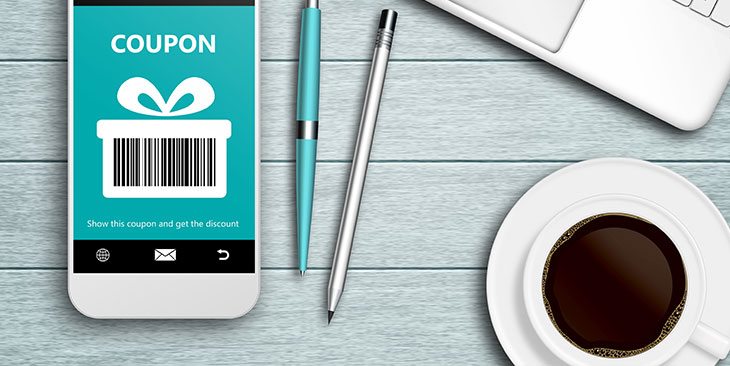Coupons have been a marketing technique for nearly 130 years. The very first coupon was distributed by Coca-Cola in 1887, and the concept beloved by consumers of all ages has never looked back.
Countless adults scan through local circulars, scouring the pages for sales and discounts on everyday products to save money. “Extreme couponing” is a permanent entry in our collective lexicon. In a world where prices are constantly going up, consumers are always looking for anything that will drive them back down: gas points at the grocery store, validating their parking ticket, or … couponing.
There’s something about coupons that makes people feel as though they’re beating the system. Intuitively, we believe coupons save us money and cause big faceless corporations to lose money. It’s exciting. But when you really think about it, why would a company subject itself to profit loss?
Believe it or not, companies often rely on coupons as much as consumers do—but for a whole different reason. After all, coupons come out of the marketing budget.
How do companies benefit from distributing coupons?
Asa Candler could not have had any idea of how legendary his concept would become when he conceived and advertised that first Coca-Cola coupon all those years ago. Coupons have transformed the marketing industry, changed the way we look at value and even entered popular culture. Why do companies do it? It helps to:
- Advertise new products
Candler was so convinced people would buy his product that he gave them a coupon entitling them to a free glass of it. That free offer drove people to the store to try it, but when they left, they had a Coke with them, no coupon, and five fewer cents in their pocket.
- Test new products
Many companies looking to trial a new product will offer deep discounts to obtain market research. If they exhaust their coupons, people like the product; if they don’t, it’s back to the drawing board.
- Attract new customers/visitors
Whether you’re distributing coupons by way of snail mail or advertising them electronically, just by being seen, coupons build your brand awareness and help draw in new business. If consumers like your discounted (or free) stuff, they might even be inclined to share your offer with their friends and family. You cannot find a better brand ambassador than that.
- Build brand loyalty
Consumers are all about discounts. A survey done by RetailMeNot found that 96 percent of Americans use coupons, and 68 percent of consumers believe coupons help build brand loyalty. If consumers are satisfied with the free trial or product/service at a discounted price, they’re more likely to pay full price the next time they need it.
Good quality products at discounted prices are every avid couponer’s dream. Fulfill their dream, and they’ll fulfill yours.
Also on StartupNation.com: Digital Marketing Trends for 2016 [Infographic]
Are paper or electronic coupons preferred?
With the rapid and expanding growth of digital technology, paper communication is slowly starting to disappear. We live in a society where communication has evolved from conversations at afternoon tea parties to telecommuting through cyberspace. We carry our main source of communication—the smartphone—in our back pockets almost constantly as we pursue our workaday lifestyles.
The Pew Research Center released a poll last year showing that 64 percent of adults in the U.S. own smartphones, up from 35 percent in 2011. More than 80 percent of American millennials own smartphones, and as they start to grow their own families, they are increasingly looking for new, innovative ways to save money. Coupons may not seem innovative, but with such a high number of smartphone users, it only makes sense to distribute coupons electronically.
Smartphones are expected to supply 80 percent of the world’s mobile data traffic by 2020. Already, people are pulling out their smartphones at the point of sale to have a coupon they scanned an hour ago redeemed on the spot.
The kind of coupon preferred by the public really depends on the product or service being offered. Paper is still the preference of grocer store couponers, since digitally storing a great number of them remains a laborious process. Digital is the go-to method for one-time redemption, such as a dinner check or a percentage off the coupon owner’s total purchase.
Are coupons still a good deal for consumers?
Coupons must be doing something right. It’s one of the only marketing methods that has a reality show dedicated to its targeted consumers. People of any class structure get a thrill when they find a good one. It’s just a natural human reaction. And then, there is the black-and-white proof that you’ve saved money in the form of your receipt. Coupons are that rare marketing commodity that truly is win, win.
Whether a company loses or makes money on a given consumer is really beside the point. Associating your brand with the exhilarating experience of hunting, finding and redeeming a coupon is more than enough. For that consumer, your product will forever be tied to a primal, visceral feeling of getting a good deal.






